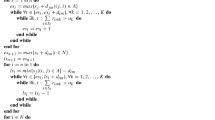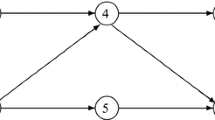Abstract
Resource-constrained project scheduling problem is to make a schedule for minimization of the makespan subject to precedence and resource constraints. In this paper, we consider an uncertain resource-constrained project scheduling problem (URCPSP) in which the activity durations, with no historical data generally, are estimated by experts. In order to deal with these estimations, an uncertainty-theory-based project scheduling model is proposed. Furthermore, a genetic algorithm integrating a 99-method based uncertain simulation is designed to search the quasi-optimal schedule. Numerical examples are also provided to illustrate the effectiveness of the model and the algorithm.


Similar content being viewed by others
References
Herroelen W, De Reyck B, Demeulemeester E (1998) Resource-constrained project scheduling: a survey of recent developments. Comput Oper Res 25(4):279–302
Blazewicz J, Lenstra JK, Kan A (1983) Scheduling subject to resource constraints: classification and complexity. Discret Appl Math 5(1):11–24
Herroelen W, Leus R (2005) Project scheduling under uncertainty: survey and research potentials. Eur J Oper Res 165(2):289–306
Igelmund G, Radermacher FJ (1983) Preselective strategies for the optimization of stochastic project networks under resource constraints. Networks 13(1):1–28
Tsai YW , Gemmill DD (1998) Using tabu search to schedule activities of stochastic resource-constrained projects. Eur J Oper Res 111(1):129–141
Stork F (2000) Branch-and-bound algorithms for stochastic resource-constrained project scheduling. Technical Rep 702–2000
Ballestín F (2007) When it is worthwhile to work with the stochastic rcpsp? J Sched 10(3):153–166
Ballestin F, Leus R (2009) Resource-constrained project scheduling for timely project completion with stochastic activity durations. Prod Oper Manag 18(4):459–474
Ashtiani B, Leus R, Aryanezhad MB (2011) New competitive results for the stochastic resource-constrained project scheduling problem: exploring the benefits of pre-processing. J Sched 14(2):157–171
Creemers S (2015) Minimizing the expected makespan of a project with stochastic activity durations under resource constraints. J Sched 1–11
Liu B (2015) Uncertainty theory. Springer-Verlag, Berlin
Ke H, Liu B (2010) Fuzzy project scheduling problem and its hybrid intelligent algorithm. Appl Math Model 34(2):301–308
Wang X, Xing H, Li Y, Hua Q, Dong C, Pedrycz W (2015) A study on relationship between generalization abilities and fuzziness of base classifiers in ensemble learning. Fuzzy Syst IEEE Trans 23(5):1638–1654. doi:10.1109/TFUZZ.2014.2371479
Ke H, Liu B (2005) Project scheduling problem with stochastic activity duration times. Appl Math Comput 168(1):342–353
Wang XZ, He YL, Wang DD (2014) Non-naive bayesian classifiers for classification problems with continuous attributes. Cybern IEEE Trans 44(1):21–39
Sun B, Ma W (2015) Rough approximation of a preference relation by multi-decision dominance for a multi-agent conflict analysis problem. Inf Sci 315:39–53
Wang XZ, Dong LC, Yan JH (2012) Maximum ambiguity-based sample selection in fuzzy decision tree induction. Knowl Data Eng IEEE Trans 24(8):1491–1505
Wang XZ, Dong CR (2009) Improving generalization of fuzzy if-then rules by maximizing fuzzy entropy. Fuzzy Syst IEEE Trans 17(3):556–567
Liu B (2007) Uncertainty Theory. Springer-Verlag, Berlin
Liu B (2010) Uncertainty Theory. Springer-Verlag, Berlin
Chen X (2011) American option pricing formula for uncertain financial market. Int J Oper Res 8(2):32–37
Chen X (2012) Variation analysis of uncertain stationary independent increment processes. Eur J Oper Res 222(2):312–316
Ke H., Su T., Ni Y (2014) Uncertain random multilevel programming with application to production control problem. Soft Comput 1–8. doi:10.1007/s00500-014-1361-2
Qin Z, Kar S (2013) Single-period inventory problem under uncertain environment. Appl Math Comput 219(18):9630–9638
Zhang B, Peng J (2013) Uncertain programming model for uncertain optimal assignment problem. Appl Math Model 37(9):6458–6468
Huang H, Ke H (2014) Pricing decision problem for substitutable products based on uncertainty theory. J Intell Manuf. doi:10.1007/s10845-014-0991-7
Zhang X, Chen X (2012) A new uncertain programming model for project scheduling problem. Inf Int Interdiscip J 15(10): 3901–3910
Ji X, Yao K (2014) Uncertain project scheduling problem with resource constraints. J Intell Manuf 1–6. doi:10.1007/s10845-014-0980-x
Ding C, Zhu Y (2014) Two empirical uncertain models for project scheduling problem. J Oper Res Soc. doi:10.1057/jors.2014.115
Ke H (2014) A genetic algorithm-based optimizing approach for project time-cost trade-off with uncertain measure. J Uncertain Anal Appl 2(8)
Ke H, Liu H, Tian G (2015) An uncertain random programming model for project scheduling problem. Int J Intell Syst 30(1):66–79
Artigues C, Roubellat F (2000) A polynomial activity insertion algorithm in a multi-resource schedule with cumulative constraints and multiple modes. Eur J Oper Res 127(2):297–316
Ke H, Liu B (2007) Project scheduling problem with mixed uncertainty of randomness and fuzziness. Eur J Oper Res 183(1):135–147
Zhu J, Li X, Shen W (2011) Effective genetic algorithm for resource-constrained project scheduling with limited preemptions. Int J Mach Learn Cybern 2(2):55–65
Kolisch R, Sprecher A (1997) Psplib-a project scheduling problem library: Or software-orsep operations research software exchange program. Eur J Oper Res 96(1):205–216
Liu Y, Ha M (2010) Expected value of function of uncertain variables. J Uncert Syst 4(3):181–186
Acknowledgments
This work was supported by National Natural Science Foundation of China (No.71371141, 71071113, 71001080), a Ph. D. Programs Foundation of Ministry of Education of China (No. 2010007211011), Shanghai Philosophical and Social Science Program (No. 2010BZH003), and the Fundamental Research Funds for the Central Universities.
Author information
Authors and Affiliations
Corresponding author
Appendix
Appendix
In this section, some concepts and theorems of uncertainty theory are introduced to lay the foundation for the URCPSP modeling. Uncertainty theory is a branch of axiomatic mathematics for subjective uncertainty modeling, which has been well developed and applied in a wide variety of real problems.
Let \(\Gamma\) be a nonempty set, \(\fancyscript{ L }\) a \(\sigma\)-algebra over \(\Gamma\), and each element \(\Lambda\) in \(\fancyscript{L}\) is called an event. Uncertain measure is defined as a function from \(\fancyscript{L}\) to [0, 1]. In detail, the concept of uncertain measure is pioneered by [19] and redefined by [20]. Uncertain measure \(\fancyscript{M}\) is a set function defined over the following four axioms.
Axiom 1
(Normality Axiom) \(\fancyscript{M}\{\Gamma \}=1\).
Axiom 2
(Duality Axiom) \(\fancyscript{M}\{\Lambda \}+\fancyscript{M}\{\Lambda ^{c}\}=1\) for any event \(\Lambda\).
Axiom 3
(Subadditivity Axiom) For every countable sequence of events \(\{\Lambda _{i}\}\), we have:
Axiom 4
(Product Measure Axiom) Let \((\Gamma _k, \fancyscript{L}_{k}, \fancyscript{M}_{k})\) be uncertainty spaces for \(k=1,2,\ldots\), the product uncertain measure \(\fancyscript{M}\) is an uncertain measure satisfying
where \(A_{k}\) are arbitrarily chosen events from \(\fancyscript{ L }_{k}\) for \(k=1,2,\ldots\), respectively.
Definition 1
[19] An uncertain variable is a measurable function \(\xi\) from an uncertainty space \((\Gamma , \fancyscript{ L }, \fancyscript{M})\) to the set of real numbers, i.e., for any Borel set B of real numbers, the set
is an event.
The uncertainty distribution is indispensable to establish the practical uncertain optimization problems model.
Definition 2
[19] The uncertainty distribution \(\Phi\) of an uncertain variable \(\xi\) is defined by
for any real number x.
An uncertainty distribution \(\Phi\) is confirmed to be regular if its inverse function \(\Phi ^{-1}(\alpha )\) exists uniquely for each \(\alpha \in [0,1]\).
Definition 3
[19] Let \(\xi\) be an uncertain variable. The expected value of \(\xi\) is defined by
provided that at least one of the above two integrals is finite.
Lemma 1
[20] Let \(\xi\) be an uncertain variable with uncertainty distribution \(\Phi\). If the expected value exists, then
Lemma 2
([20]) Let \(\xi\) be an uncertain variable with regular uncertainty distribution \(\Phi\). If the expected value exists, then
Example 1
The expected value of the zigzag uncertain variable \(\xi =\fancyscript{ Z }(a,b,c)\) is:
Lemma 3
[20] Let \(\xi _{1}, \xi _{2}, \ldots ,\xi _{n}\) be independent uncertain variables with regular uncertainty distributions \(\Phi _{1},\Phi _{2},\ldots ,\Phi _{n}\), respectively. A function \(f(x_{1},x_{2},\ldots ,x_{n})\) which is strictly increasing with respect to \(x_{1},x_{2},\ldots ,x_{m}\) and strictly decreasing with respect to \(x_{m+1},x_{m+2},\ldots ,x_{n}\). Then the \(\xi =f(\xi _{1},\xi _{2},\ldots , \xi _{n})\) is an uncertain variable with inverse uncertainty distribution
Lemma 4
[36] Let \(\xi _{i}(i = 1, 2, . . . , n)\) be independent uncertain variables with regular uncertainty distributions \(\Phi _{1},\Phi _{2},\ldots ,\Phi _{n}\) respectively. If a function \(f(x_{1},x_{2},\ldots ,x_{n})\) is strictly increasing with respect to \(x_{1},x_{2},\ldots ,x_{m}\) and strictly decreasing with respect to \(x_{m+1},x_{m+2},\ldots ,x_{n}\) , respectively, then the expected value of uncertain variables \(\xi =f(\xi _{1},\xi _{2},\ldots , \xi _{n})\) has an expected value as follows:
provided that the expected value \(E[\xi ]\) exists.
Rights and permissions
About this article
Cite this article
Ma, W., Che, Y., Huang, H. et al. Resource-constrained project scheduling problem with uncertain durations and renewable resources. Int. J. Mach. Learn. & Cyber. 7, 613–621 (2016). https://doi.org/10.1007/s13042-015-0444-4
Received:
Accepted:
Published:
Issue Date:
DOI: https://doi.org/10.1007/s13042-015-0444-4




